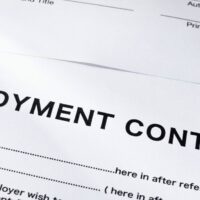Understanding the essentials of an employee contract is essential for employees and employers. Yours should provide clarity and assurance regarding the terms of employment for both parties, outlining rights and responsibilities. Managing the fine print of these contracts can be intimidating, however. An employee or employer may want to pursue legal action when these contracts are incorrectly written or misunderstood. That is why we stress the importance of writing employee contracts correctly the first time and reviewing and revising them as[…] Read More
Blog
What Are Some Factors of a Solid Employment Contract?
Having a solid employment contract is important for safeguarding your rights. This contract not only delineates the expectations and responsibilities of both parties but also serves as a protective legal document in case disputes arise. The following are critical factors that employees in New Jersey must consider when reviewing or negotiating an employment contract. Clear Job Description A comprehensive job description is the cornerstone of an effective employment contract. It should detail the duties, responsibilities, and expectations for the position. A[…] Read More
What Are the Types of Sexual Harassment in the Workplace?
In today’s professional environment, it is crucial to understand and recognize sexual harassment in all its forms. This knowledge empowers workers to protect themselves and their colleagues from inappropriate and unlawful behavior. This blog aims to explain the different types of sexual harassment that can occur in the workplace. Quid Pro Quo Sexual Harassment Quid Pro Quo, Latin for “this for that,” refers to situations where employment decisions such as promotions, raises, or job security are based on an employee’s submission[…] Read More
Founder Leo B. Dubler, III, Esq. Selected to the 2024 New Jersey Super Lawyers List
The Law Offices of Leo B. Dubler, III, LLC proudly announce that Founder Leo B. Dubler, III, Esq. has been selected to the 2024 New Jersey Super Lawyers list for his achievements. Leo is a certified Civil Trial Attorney, bestowed by the New Jersey Supreme Court to only three percent of attorneys in the state. For over 25 years, Leo has been a dedicated advocate for victims of workplace discrimination, whistleblowers, and clients seriously injured by the negligence of others.[…] Read More
Understanding Employee Wage and Hour Disputes
As an employee, understanding your rights is essential for ensuring fair treatment in the workplace. One of the most common issues employees face is wage and hour disputes. It is crucial for you, as a worker in New Jersey, to know your rights and understand what steps to take when faced with such a dispute. Wage and hour laws are in place to protect employees from unfair pay practices. They dictate the minimum wage an employer can pay, overtime pay[…] Read More











